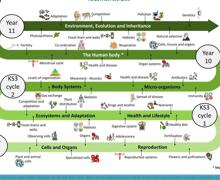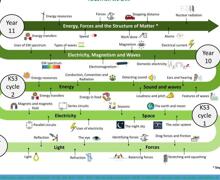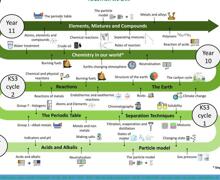- Home
- Curriculum
- Subject Information
- Science
Science
Science Curriculum
Science at The Abbey school allows students to connect and understand the ideas, uses and implications of Science today and in the future. We aim for students to leave with clear explanations of the world we live in.
The Science curriculum at The Abbey school aims to
- Develop students’ understanding of how Science is reflected in the world around them and how they can use Science to make a positive impact on society and the environment.
- Develop students' logical thinking and problem-solving skills.
- Combine basic Maths and English skills in context to help develop analytical thinking and present scientific information in a number of different ways.
- To provide students with opportunities to work scientifically so that they can develop a passion and enthusiasm for learning that remains with them throughout their lives and equips them with the transferable skills needed to become successful citizens.
We bring a mixture of practical work and theory into all aspects of the curriculum which includes the tradition of scientific enquiry, according to the principles of scientific method.
We stress the relevance of science beyond the classroom and, in this sense, teach Science as a fundamental building block for life beyond school. We seek to develop a lifelong love of learning and to empower students to think independently.
Science is a vibrant, ever-changing, relevant subject that affects every walk of life and this is reflected in how we teach and what we offer all our students. In KS3 the curriculum is topic based. We offer topics covering all three science disciplines to ensure breadth of experience. Each class will have three science lessons per week and the lessons within a topic will build on prior knowledge and knowledge gained in previous lessons. In KS4 our focus is on gaining qualifications and enquiry-based learning. Each class has either two or three lessons of science a week depending on the curriculum pathway that they are on.
At The Abbey school we offer a number of science trips throughout the year which aim to enhance and reinforce the learning that is taking place in the classroom. This also gives our students the opportunity to see and witness science taking place in real life and give students more context to the science that is happening in the classroom. By offering a broad curriculum and different assessment and accreditation pathways, every student will leave with the skill set and qualifications they need to transition into their post 16 provision.
Supporting Reading
Subject disciplinary literacy is taught explicitly in Science with key words identified and introduced at the start of topics and revisited regularly to aid retention. Specific key words are highlighted in green to give focus in each lesson. Words mats, matching words, supporting images and examples are all used to introduce key vocabulary. Repetition of new and key vocabulary is used to support learning and to give students context to use these words.
In Science, the ‘incidental teaching’ of phonics using Abbey Phonics supports both decoding and encoding. Scripts are used to give a consistent approach across the school.
Where possible, stories are used to bring ideas to life, to give context to learning and to support retention.
Widgit symbols are used in addition to text to support comprehension for students when reading.
In Science, we provide regular opportunities for students to read a range of different texts. We encourage students to read for learning, moving beyond the mechanics of reading to gathering meaning and information from the text. We also give recommendations of reading materials to encourage reading beyond the classroom.
Students have access to headsets & Chromebooks where they can use the dictation feature or use the Select to Speak tool, reading selected text to the user.
Year 7 Overview
|
Autumn 1 |
Autumn 2 |
Spring 1 |
Spring 2 |
Summer 1 |
Summer 2 |
|
Cells |
Acids and Alkalis |
Light |
Reproduction |
Particles and their behaviour |
Forces |
Year 8 & 9 Overview
Cycle 1
|
Autumn 1 |
Autumn 2 |
Spring 1 |
Spring 2 |
Summer 1 |
Summer 2 |
|
Separation techniques |
Health and lifestyle |
Space |
The periodic table |
Electricity |
Eco systems |
Cycle 2
|
Autumn 1 |
Autumn 2 |
Spring 1 |
Spring 2 |
Summer 1 |
Summer 2 |
|
Structure and function of body systems |
Chemical reactions |
Energy |
The earth and its atmosphere |
Microbes |
Working scientifically |
Year 10 & 11 Overview
Cycle 1/ Year 10
|
Autumn 1 |
Autumn 2 |
Spring 1 |
Spring 2 |
Summer 1 |
Summer 2 |
|
The Human body |
The human body |
Chemistry in our world |
Chemistry in our world |
Electricity, magnetism and waves |
Electricity, magnetism and waves |
Cycle 2/ Year 11
|
Autumn 1 |
Autumn 2 |
Spring 1 |
Spring 2 |
Summer 1 |
Summer 2 |
|
Elements, mixtures and compounds |
Elements, mixtures and compounds |
Energy, forces and the structure of matter |
Energy, forces and the structure of matter |
Environment, evolution and inheritance |
Environment, evolution and inheritance |
Assessment
All students' Science baselines are assessed on entry to The Abbey School. Students are assessed using regular internal teacher assessments, against the APS levels, throughout topics and at the end of each half term. These teacher assessments inform and support medium/short term planning. In KS4 their assessment grades may contribute towards the accreditations taken.








